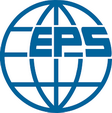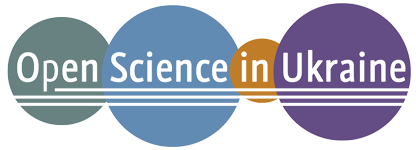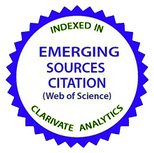Lu-V-{Ge, Sn} ternary systems
DOI:
https://doi.org/10.15330/pcss.20.1.76Keywords:
Intermetallics, Ternary system, Solid solution, Phase equilibriaAbstract
The isothermal sections of the phase diagrams of the Lu–V–Ge and Lu-V-Sn ternary systems were constructed at 870 K over the whole concentration range using X-ray diffraction and EPM analyses. In the Lu-V-Ge system a formation of the substitutional solid solution Lu5Ge3-xVx based on the Lu5Ge3binary compound (Mn5Si3 structure type) was found up to 6 at. % V. Insertion of the V atoms in the structure of the LuGe2 binary germanide (ZrSi2structure type, up to 5 aт. % V) results in the formation of the LuV0,15Ge2 ternary phase (CeNiSi2 structure type, space group Cmcm, a=0.40210(4),b=1.5661(1), c=0.38876(3) nm), which corresponds to the limit composition of the interstitial solid solution LuVxGe2. The interaction between the elements in the Lu-V-Sn system results in the formation of one ternary compound LuV6Sn6 (SmMn6Sn6-type, space group P6/mmm, a=0.5503(2), c=0.9171(4) nm) at investigated temperature.
References
[2] R. V. Skolozdra, in: K. A. Gschneidner, Jr., L. Eyring (Eds.), Stannides of rare-earth and transition metals, Handbook on the Physics and Chemistry of Rare-Earths, Vol. 24, North-Holland, Amsterdam, 1997, P.399-517.
[3] Ya. Mudryk, L. Romaka, Yu. Stadnyk, O. Bodak, D. Fruchart, J. Alloys Compd. 383, 162 (2004) (doi.org/10.1016/j.jallcom.2004.04.040).
[4] L. C. J. Pereira, D. P. Rojas, J. C. Waerenborgh, J. Alloys Compd. 396, 108 (2005) (doi.org/10.1016/j.jallcom.2004.11.061).
[5] L. Romaka, Yu. Stadnyk, V. V. Romaka, P. Demchenko, M. Stadnyshyn, M. Konyk, J. Alloys Compd. 509, 8862 (2011)
(doi.org/10.1016/j.jallcom.2011.06.095).
[6] M. Konyk, L. Romaka, Yu. Stadnyk, V. V. Romaka, R. Serkiz, Visnyk Lviv. Univ. Ser. Chem. 59(1), 11 (2018) (doi.org/10.30970/vch.5901.011).
[7] H. Bie, A. Mar, J. Mater. Chem. 19, 6225 (2009) (doi.org/10.1039/B908781H).
[8] L. Akselrud, Yu. Grin. WinCSD: software package for crystallographic calculations (Version 4). J. Appl. Cryst. 47, 803 (2014) (DOI:doi.org/10.1107/S1600576714001058).
[9] T. Roisnel, J. Rodriguez-Carvajal, WinPLOTR: a Windows tool for powder diffraction patterns analysis. Mater. Sci. Forum 378–381, 118 (2001).
[10] T. B. Massalski, in: Binary Alloy Phase Diagrams, ASM, Metals Park, Ohio, 1990.
[11] J. F. Smith, K. J. Lee, Phase Diagrams of Binary Vanadium Alloys, ASM International, Metals Park, OH. (1989).
[12] P. Villars, L. D. Calvert, in: Pearson’s Handbook of Crystallographic Data for Intermetallic Phases, ASM, Metals Park, OH, 1991.
[13] K. Achdar, N. Selhaoui, A. Iddaoudi, R. Tamim, H. Azza, L. Bouirden, Calphad 62, 18 (2018) (doi.org/10.1016/j.calphad.2018.05.001).
[14] V. N. Eremenko, K. A. Meleshevich, Y. I. Buyanov, V. M. Petyukh, Dop. AN URSR Ser. A 5, 76 (1987).
[15] E. I. Hladyshevskii, Dop. AN URSR Ser. A 42, 91 (1980).
[16] O. Y. Oleksyn, O. I. Bodak, J. Alloys Compd. 210, 19 (1994) (doi.org/10.1016/0925-8388(94)90108-2).
[17] Y. B. Tyvanchuk, Y. M. Kalychak, V. I. Zaremba, L. D. Gulay, Pol. J. Chem. 76, 491 (2002).
[18] P. Israiloff, H. Vollenkle, A. Witmann, Monatsh. Chem. 105, 1387 (1974).
[19] M. A. Rykova, A. V. Sabirzyanov, P.V. Gel’d, Inorg. Mater. 7, 765 (1971).
[20] P.Chaddan, R. O. Simmons, Phys. Rev. B: Condens. Matter. 27, 119 (1983) (doi.org/10.1103/PhysRevB.27.119).
[21] C.-Y. Yue, F.-X. Zhou, M.-F. Wang, H.-P. Zhang, X.-W. Lei, Chinese J. Struct. Chem. 32(6), 857 (2013).
[22] A. Jandelli, A. Palenzona, G.B. Bonino, Atti. Accad. Naz. Lincei 40, 623 (1966).
[23] W. Jeitschko, E. Parté, Acta Crystallogr. 22, 551 (1967) (doi: 10.1107/S0365110X67001112).
[24] T. Wolpl, W. Jeitschko, J. Alloys Compd. 210, 185 (1994) (doi.org/10.1016/0925-8388(94)90136-8).
[25] N. Morton, B. M. Jarnes, G. H. Wostenholm, N. A. Howard, J. Less-Common Met. 64, 69 (1979) (doi.org/10.1016/0022-5088(79)90133-4).
[26] M. Francois, G. Venturini, B. Malaman, B. Roques, J. Less-Common Met. 160, 197 (1990) (doi.org/10.1016/0022-5088(90)90381-S).
[27] L. Romaka, V. V. Romaka, P. Demchenko, R. Serkiz, J. Alloys Compd. 507, 67 (2010) (doi.org/10.1016/j.jallcom.2010.07.137).
[28] L. Romaka, Yu. Stadnyk, R. Serkiz, Visnyk Lviv. Univ. Ser. Chem. 58, 27 (2017).
[29] L. Romaka, I. Romaniv, V. V. Romaka, V. Pavlyuk, J. Alloys Compd. 631, 288 (2015) (doi.org/10.1016/j.jallcom.2014.12.256).
[30] L. Romaka, I. Romaniv, V. V. Romaka, M. Konyk, A. Horyn, Yu. Stadnyk, Phys. Chem. Solid State 19(2), 139 (2018) (DOI: 10.15330/pcss.19.2.139-146).









